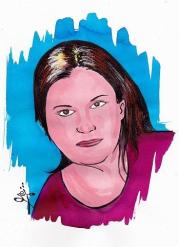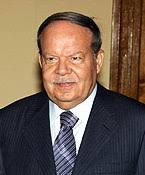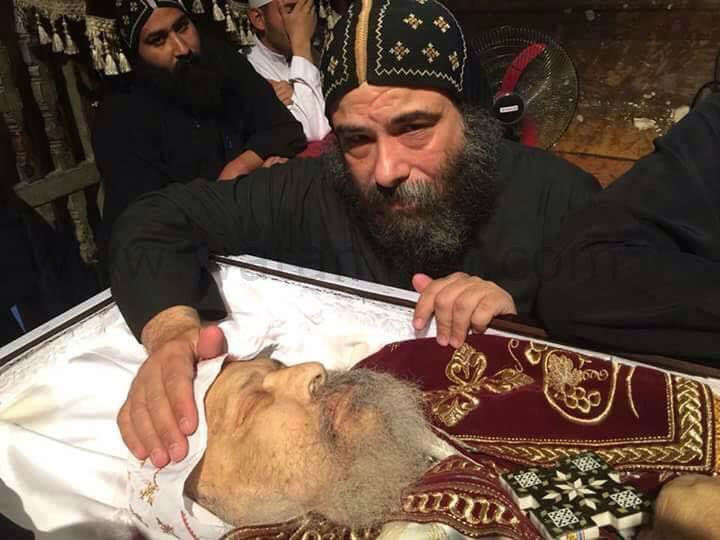Last Sunday saw the funeral of Ola Ghabbour (1960 – 2013), Member of the Board of Trustees of the Foundation of the 57357 Children’s Cancer Hospital in Cairo and Secretary-
General of its board of directors, and wife of business tycoon Raouf Ghabbour.
The funeral service was held at St Mark’s cathedral in Abassiya, Cairo. Pope Tawadros II delegated Bishop-General Anba Yu’annis to preside over the service and relay his condolences to the family. Participating in the service were Anba Psanti of Helwan and Bishop-General Anba Ermiya. Anba Yu’annis delivered a word to the family and friends of the deceased; the mourners who had come to pay their last respects to the great humanitarian packed the cathedral full. The bishop spoke about how short the span of life of man is, and how well and wisely it should be used. Ola Ghabbour, he said, had used it to offer loving service to the sick, especially children, who were in dire need of help and compassion.
Wife and mother
Ola Ghabbour passed away on 8 January in hospital in Houston, after a four-month struggle with lung cancer, Mrs Ghabbour was wife of Raouf Ghabbour, the pioneer of car manufacture in Egypt. She leaves behind three children Kamal, Nader, and Dina who is married to Sherif Abdel-Nour and has one daughter, Mariam. The young Ghabbours are business administration graduates and are working with their father in his enterprise, Ghabbour Auto.
57357
Ola Ghabbour was a pioneering philanthropist and an untiring advocate and friend of children. She was the primary catalyst behind the foundation of the now-famous Children##s Cancer Hospital 57357 in Cairo. The ‘57357’ is the number of the bank account through which donations were invited; the hospital became so linked to the figure that it was finally—and
.jpg)
spontaneously—named after it. Mrs Ghabbour began fundraising among her family and friends despite ridicule for her seemingly impossible dream. In her campaign she encouraged even the poor to donate, and her dream finally began to materialise in 1999 with the start of construction of the building. Today, the hospital’s website carries the message: ”Children’s Cancer Hospital Egypt 57357 is the largest children’s cancer hospital in the world. CCHE is leading the way in healthcare in Egypt and is a model of what people can do when they work together for the benefit of mankind.”
Mrs. Ghabbour is also one of the founders of the Breast Cancer Foundation of Egypt, Chairman of the Board of the Association of Friends of the National Cancer Institute (AFNCI). She was actively involved with countless other hospitals and foundations that offered health care to the needy.
In 2008, Mrs. Ghabbour received the prestigious World Health Award.
Last May she was recognised by the Middle East and North Africa American Chamber of Commerce Seminar held in Tunisia, as the Best Woman within non-profit organisations, for her role in the foundation of the 57357 Hospital, as well as for her pioneering charity work.
A Christian related to Islam
Nevine Loutfy, who met Ola for the first and only time in Tunisia in May last year, says that in that event, “Azza Fahmy, Ola and I were recognised by AmCham. Ola had a short clip showing the achievements in the Children cancer hospital. Once we watched it, we felt whatever we were recognised for was a big NOTHING relative to what Ola had achieved, she was certainly in a league of her own and yet so modest about it. After the ceremony I had the pleasure of spending a few hours with her and her mom and she told me all about the hospital. She teared up when she remembered some of the children lost and glowed when she talked about the survivors.
“She told me when she went to Jerusalem she visited the Aqsa Mosque and said a prayer there which confused a clergyman as she was wearing her big gold cross. But she explained to him that she was Christian but had a strong relationship with Islam.
“On donations, she asked me not to send the annual Bank (where I work) donation to the hospital as it had received enough for the year, instead she asked me to send the money to some other organisation that was really short. I was humbled to be in her company that night and truly admired everything about what she did for the children and the country. When asked about people who were major members of the pre-2011 revolution regime, and who had fallen out of favour post revolution, she had nothing but words of praise and respect for how they had supported the hospital efforts. She was loyal to their memory and respectful of their efforts.
“May her soul rest in peace. Ola was a great example of a great Egyptian woman.”
Daily visits
“I had the privilege of working closely with her whenever we would receive important guests at the Hospital,” Myra Doss, Publications Manager at the Children’s Cancer Hospital Foundation, told Watani.
“I was involved with her on a couple of fundraising missions. From her, I learned how to push aside my pride and ego in order to ask boldly people to donate for the cause. She never shied away of approaching the wealthy and famous for the sake of the sick children, her children. God only knows how hard it is to ask the well to do for money!”
Ola was never after fame or glory, Ms Doss says, in fact, in all humbleness and humility she often wished I would replace her in reading official speeches or addressing an official audience. Her only concern was to rally more and more people around the nearest cause to her heart: the cause of the children with cancer. I always wondered how she managed to get the energy and time to be also involved with so many other worthwhile causes like the Association of friends of the National Cancer Institute, the Magdi Yacoub Heart Foundation, the Abul-Reesh Children’s Hospital, the breast Cancer Foundation of Egypt, the Special Olympics Foundation, to cite but a few. The truth of the matter is that she could not refuse to extend a helping hand to each and every person soliciting her advice, experience and support in fundraising.
“People often ask me how I manage to be working constantly around sick children with cancer. For Ola Ghabbour, the daily encounter with the children was a touching, intense and emotional experience she was keen not to miss on. On a daily basis, she would visit the wards and reach out to the children and their families listening carefully to their concerns.”
Concerned about the future
For Ashraf Khalil, Ola was unique, charitable, sociable, genuinely compassionate, and she was charismatic. Khalil posted a comment on Watani’s Facebook page to say: “Ola was always carrying out her momentous duties, yet at such a low profile. She never showed off, never appeared in media, never announced what miracles she had achieved to please the sick children, never published her great assignments in any kind of advertisement. She was always behind the curtain even during the launch of 57357 when she refused to be with the hospital Board while taking photos with Suzanne Mubarak. She was so modest; beyond anything I ever witnessed.”
Yet Ola was worried about the future of the charity work she undertook. “In 2009,” Ms Doss remembers, “we were on a special fundraising mission abroad and she confided in me about her major concern of ensuring a second generation of dedicated men and women who would
take up the huge responsibility of sustaining the continuity and advancement of the 57357 institution. Back then, she already felt that the first generation which she was part of was about to leave the stage.
“To honour her memory, acknowledge her work and efforts, and reassure her on the future of the children and the 57357 institution, we must all join our forces, carry the torch, keep up the good work for the sake of curing the children and ensuring the safeguarding and success of 57357.”
Agony of the parents
Dalia is the mother of Celine, a six-year-old little angel who lost the battle with cancer three years ago. During their stay in 57357, she had the chance to witness Ola’s genuine care for every suffering child and distressed mother. Dalia describes Ola as “a rare blend of grace, elegance, character, integrity, tenderness, care and love.”
Ola was able to run the hospital impeccably, she was respected and awed by every worker and employee, yet she was loved and admired. Ola knew every patient by name, cared for every child on a personal level and sometimes stood by their side and held them close for
comfort during painful treatment sessions. She perfectly understood how it felt for a mother to watch the suffering of her child while helplessly waiting for the inevitable; she thus overwhelmed the mothers with care and attention. At times, she would comfort a mother with words of encouragement and stories of miraculous healings, or listen patiently and feelingly to another who could do nothing to save her child. Although visiting hours were strictly observed in the ICU, Ola would sometimes allow the mothers of patients in terminal stages to spend some extra time with a child she knew they would never see or touch again.
“Ola perfectly understood the pain and despair of the parents; the sort of pain no human can tackle. She took care to provide special places for prayer, where parents may ask for divine support to sustain them through their agony.”
The angels
If there was any bias in Ola’s character, Dalia insists, it was bias towards the poor and needy. The hospital provided the same level of care and treatment for all children, rich or poor. When a well-off family offered to pay for the treatment of their child, Ola strongly refused and instead, suggested they make a donation for the support of the hospital. She argued that if the rich paid for the services they got, the poor would be intimidated and would feel inadequate.
Throughout the past three years, whenever Dalia thought of her daughter, she envisioned her as a little angel, walking up the stairway to Heaven with other little children whose life was ended too soon. But today, the vision she has is of her little angel Celine and the other little angels taking Ola by the hand and leading her to Heaven, a place she so much deserves.
WATANI International
20 January 2013.jpg)
.jpg)



.JPG)
.JPG)













